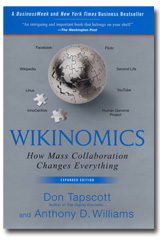Wikipedia founder Jimmy Wales the New Google Killer?
Understanding the tremendous limitations inherent in the current search system, Wikipedia found Jimmy Wales believes he can build a better one that can provide what Google (GOOG) hasn't been able to.
There are several things that are driving Wales' passion. One is the results that come up on current search systems that in many cases are irrelevant, frustrating and time consuming to rummage through. He said, "A search for Ford should yield Ford Motor Co., as the correct first answer."
Next, he likes the idea of a challenge, noting that with the financial war chest that Google has, "For developers, it would be kind of cool to say 'Google has 11 gazillion  dollars, and we're going to get a bunch of people together on the Internet, and we're going to kick their butts.' "That's cool, right? I think it's cool, he said."
dollars, and we're going to get a bunch of people together on the Internet, and we're going to kick their butts.' "That's cool, right? I think it's cool, he said."
Third, he enthusiastically embraces open source, freedom, participation and democracy on the Internet. To him a wiki search would be much more powerful and accurate as it plays to these strengths.
His beginning strategy will be to start with a couple of open source and Java Search engines that are based upon the Apache Jakarta Project called Lucene and Nutch. Programmers would be able to adjust, copy and exchange the code among one another while others give feedback, according to Wales.
While wales does have backing from Amazon.com and others, he is wise in implementing an ad revenue model from the beginning, while relying upon some hired workers for the project. I think this is smart. The idea that these things can be done for free needs to be done away with on the front side.
YouTube's struggle to find an ad model to monetize its costly site has come from the very nature of how the company started and positioned itself. Now they will have to renege on that and provide ads to make it work; something that is already causing them a lot of problems.
It is my thought that this could really be scary to Google. In my experience and estimation, they really haven't improved the search results as far as accuracy goes. If someone can come up with a much more accurate result, what would that mean in terms of time, money and targeting? It would turn the whole search landscape upside down.
I'm not sure if this is considered a threat my Google, but knowing that they've secured themselves against their biggest rivals in search, they are going after other areas that are outside of their expertise. Will that hurt them over the long run if a truly better search engine that is considered "cool" as well is built? I think it could.
Wales also said that a lot of the details like concerns about protection of privacy and others haven't been worked out yet. The first beta should be rolled out sometime within the next several months he said. Do you think it's a good idea and has a realistic chance of being successful?
Subscribe to this feed • BizzBite This! • Digg This! (3 Diggs) • Email this
related entries
- Wikipedia Founder Jimmy Wales says 'MySpace will fail..' Apr 21, 2007
- How to Make a Commercial Wiki Work Better Feb 24, 2007
- Wikipedia Founders Launching Three News and Gossip Sites Feb 15, 2007
- Jimmy Wales Takes Another Small Step Toward Open-source Search Engine Jul 28, 2007
- Wikipedia Continues to Grow in a Big Way Jul 8, 2007




